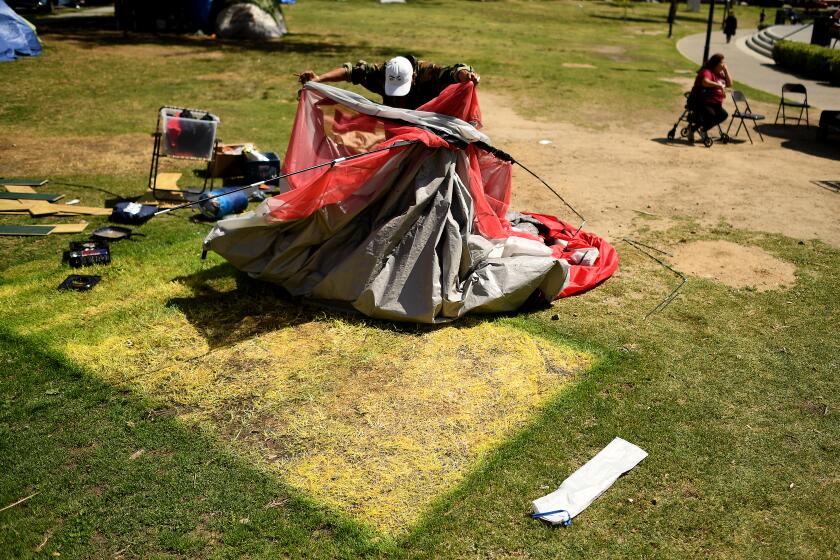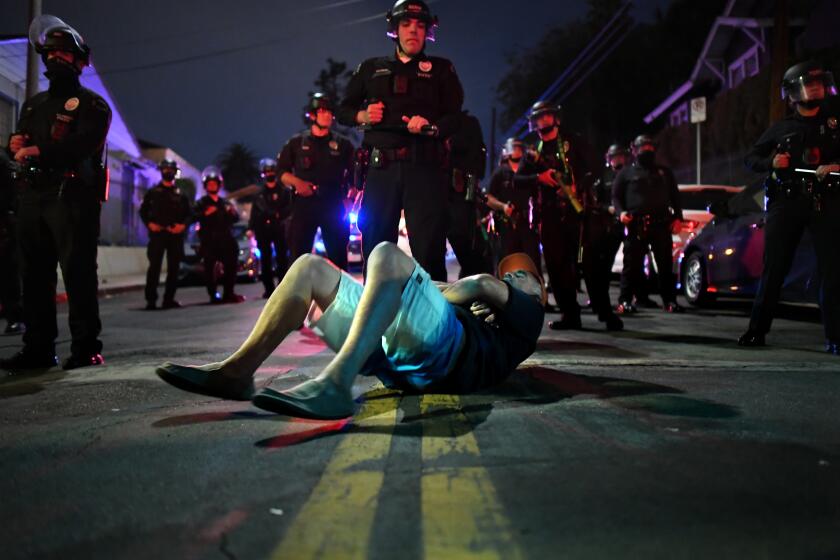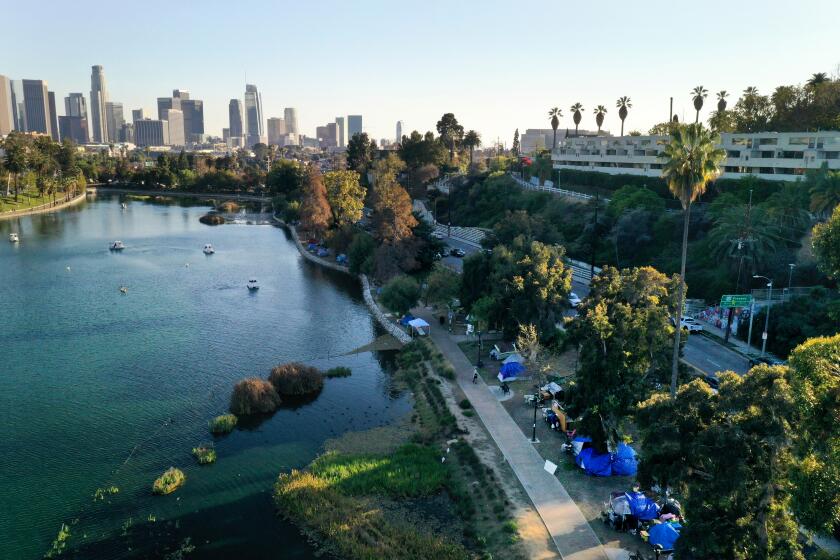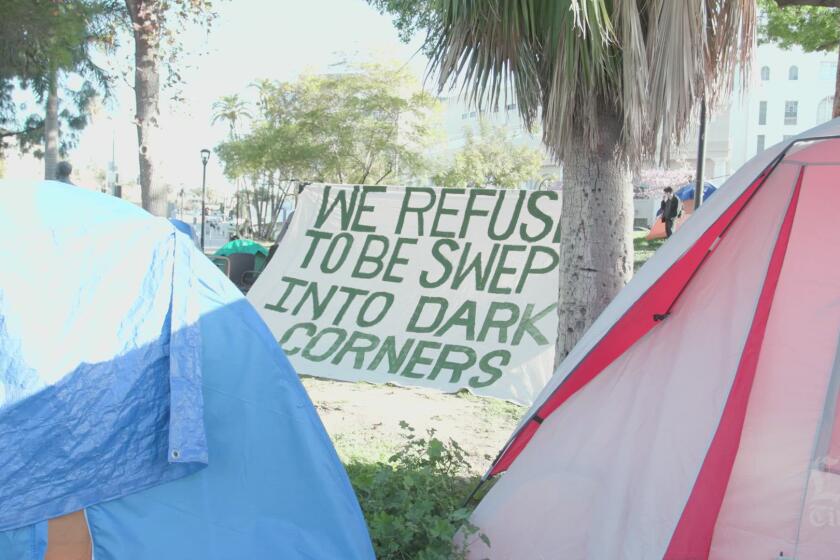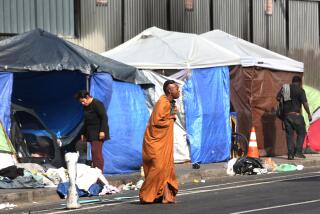With eviction hours away, homeless residents of Echo Park Lake speak of uncertainty, fear, anger
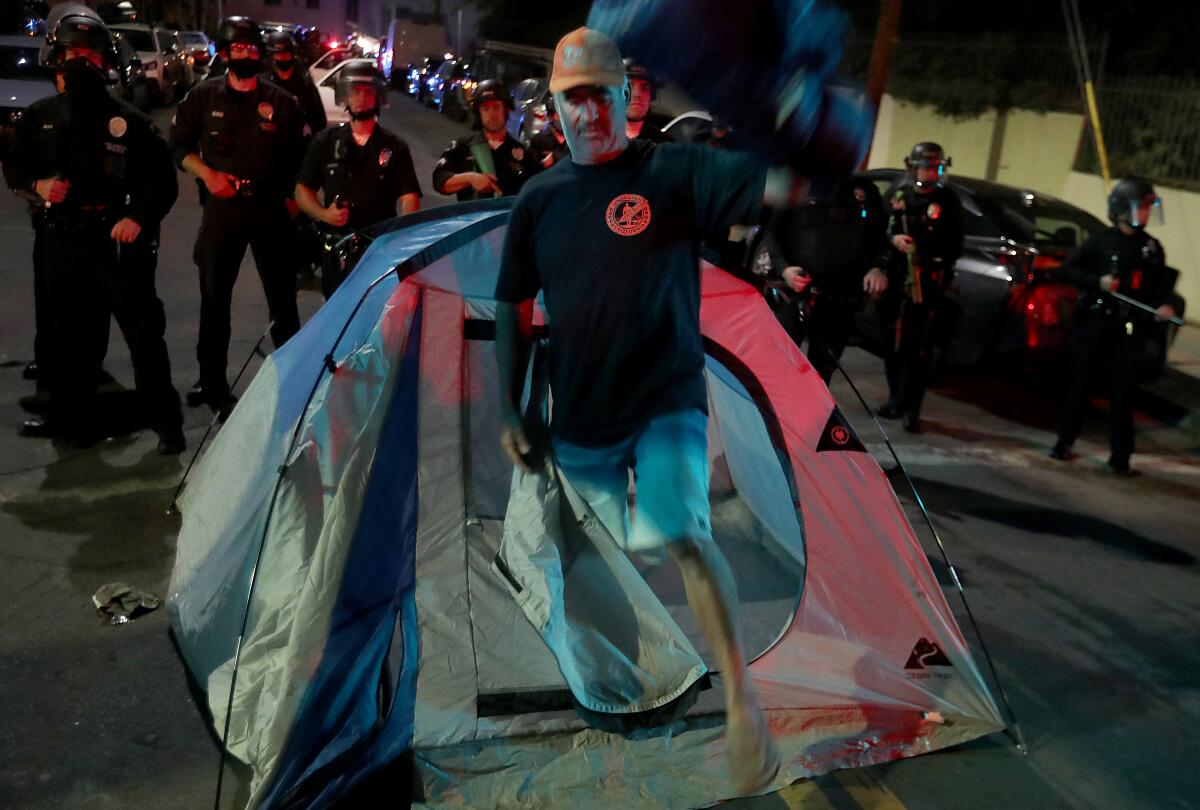
- Share via
With hours to go before Los Angeles authorities are set to clear out a homeless encampment on the shores of Echo Park Lake, the remaining people living there are pondering what to do next.
On Thursday, some people remained at the camp, which is now enclosed by gates and patrolled by police. Some have already left, agreeing to be housed in hotels by the city. Others, however, have vowed to remain, saying this spot is their home. And some have said they aren’t sure what to do or know little about what choices they may have.
The planned closure of the park comes after months of conflict between camp organizers and members of the surrounding community.
Over the last year, the encampment has grown to nearly 200 tents, covering nearly half the park and evolving into a commune-like society with a shared pantry, a garden, a veneer of self-policing and a tenuous grasp on basic sanitation. Some residents of the surrounding hillsides have demanded that the city do something about an intrusion of trash, drug use and crime. City officials said they were taking a humane approach, offering residents housing. But some say they don’t want it.
Los Angeles Police Chief Michel Moore said Wednesday night that homeless residents inside the park would be allowed to remain overnight but that no one else could enter and the encampment’s residents must leave within 24 hours.
Homeless residents of Echo Park Lake must decide to stay or go ahead of L.A.’s plan to clear the encampment and close the park for renovations.
Here are some voices from the residents of the camp:
‘We built a community together’
Along the lake, Susan Samuelson and Brenda Moreno peered out of a blue tent.
“Get everything that you want to take,” Moreno said, “because I don’t think they’re letting people back in.”
“You can’t fence up a community park,” Samuelson replied.
“They did, though! They just did!” Moreno said.
Moreno, 60, said a police officer had told her a week ago that they would have to leave the park but didn’t tell her when.
“If those people hadn’t come here and helped us last night, we would have lost everything we had,” Moreno said of the protesters who gathered Wednesday night at the park.
When asked whether she would go to a hotel room if it was offered, Moreno said, “At this point, I don’t trust them at all. There’s no telling what they’ll do to us after that.”
Moreno said she had grown up in Echo Park and found the lakeside encampment to be a refuge. “There’s zero tolerance for stealing. You keep your area clean and neat. Little things like that. ... We built a community together.”
As a helmeted police officer approached down the lakeside path, Moreno ducked into the tent alongside Samuelson. Police officers said they were checking the area for anything that could be used as a weapon.
LAPD and protesters square off in Echo Park as an imminent city closure draws near.
‘I want to be with my community’
Gustavo Otzoy, who says he has lived along the lake for seven months, said he had to go to work Thursday but didn’t want to abandon his tools — construction tools for installing tile, drywall and hardwood floors — lest he lose them.
“I need these things to work,” he said in Spanish. Beyond that worry, he said, “I want to be with my community.”
“At the beginning, I was scared when I arrived here. But nobody robbed us. Everything was good.”
A homeless encampment at Echo Park Lake has become a symbolically fraught case study of the rights to public spaces
‘Was it a victory?’
Valerie Zeller likened it to “a hostage situation.”
The homeless woman said she was reluctant to go to the hotel rooms that had been offered to people camping at the park, saying she had heard that residents would be searched and subjected to confining curfews.
Yellow tape ringed the area surrounding the park, where police cruisers blocked people from driving or walking in. Inside the fenced park, the morning chatter of birds and geese mingled with the low moan of a helicopter overhead.
Ayman Ahmed, who is living at the park, said that when police told those who were camping there they could stay until the following night, “we thought it was a victory.”
“Was it a victory?” he asked. “Twenty-four hours with a perimeter all around us?”
Protesters gather in a showdown emerging as a flashpoint in the city’s struggle with homelessness.
‘I don’t trust’
David Busch-Lilly, who was among more than a dozen people remaining inside the fenced park as dawn broke Thursday, also felt trapped.
“If I leave, I don’t trust that they’ll let me back in.”
He added: “I feel like I’m being detained.”
‘What else are you going to do?’
Late Wednesday, Edward Juarez dismantled a tent on the east side of the park as dozens of officers massed across the street. Juarez and others living in the park have to clear out by 10:30 p.m. Thursday, according to posted signs.
Juarez, a professional photographer who has lived in the park since August, said the tent belonged to a friend who’d been placed at a hotel in downtown Los Angeles last week. Juarez said he lost his livelihood when the pandemic shut down concerts and other nightlife events he worked. He planned to stay the night somewhere else, maybe at a friend’s house.
“I just want to get out of here; it’s getting crazy,” he said, nodding toward officers across the street who were wearing helmets and carrying batons.
Juarez said police came to the park last week and said the city planned to clear the area, although they didn’t tell him when the sweep would happen.
“It’s what it is,” he said. “What else are you going to do?”
More to Read
Sign up for Essential California
The most important California stories and recommendations in your inbox every morning.
You may occasionally receive promotional content from the Los Angeles Times.
